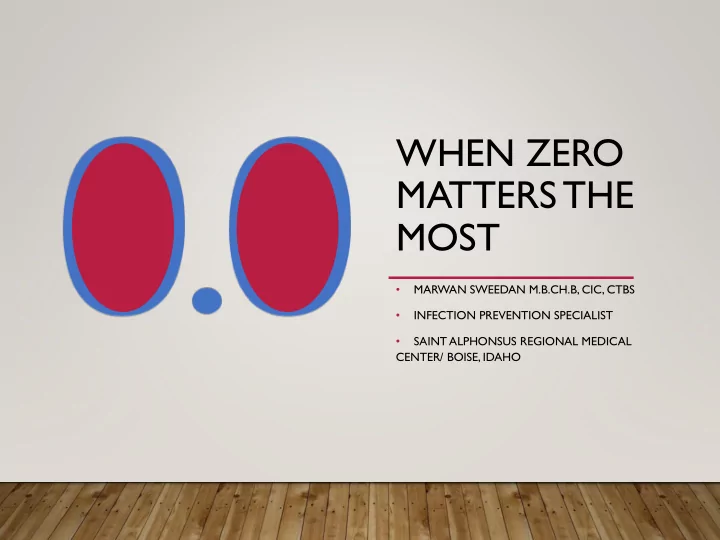

WHEN ZERO MATTERS THE MOST • MARWAN SWEEDAN M.B.CH.B, CIC, CTBS • INFECTION PREVENTION SPECIALIST • SAINT ALPHONSUS REGIONAL MEDICAL CENTER/ BOISE, IDAHO
• The Speaker discloses no actual or DISCLOSURES potential conflict of interest in relation to this presentation
ABOUT ME
LEARNING OBJECTIVE • Surgical Site Infection SSI • Discuss risk factors. • Strategies to battle SSI. • Measuring metrics. • Cultural acceptance.
SURGERY AND INFECTION
SURGICAL SITE INFECTION (SSI) In Surgery, it is important to differentiate between the quality of care and patient safety.
SURGICAL SITE INFECTION • Burden • 14.2 million inpatient operative procedure in 2014. • Between 1-3% develop SSI • Outcome • $3.3 billion annual cost. SSI cost an additional $18700. • Nearly 1 million additional inpatient-days. • • LOS is 5.1 days longer. • Majority of deaths in surgery attributed to SSI. H.CUP statistical brief#233
SURGICAL SITE INFECTION Figure 1. Percentage of inpatient stays and aggregate costs for inpatient stays with and without operating room (OR) procedures, 2014 Source: Agency for Healthcare Research and Quality (AHRQ), Center for Delivery, Organization, and Markets, Healthcare Cost and Utilization Project (HCUP) National Inpatient Sample (NIS), 2014
RISK FACTORS Patient procedure Microbiome
RISK FACTORS • Patient related • Diabetic status. • Chronic illnesses. • Smoking status. • Body Mass Index • Nutrition status. • Age and wellbeing Do you think socio-economic class play role in SSI?
RISK FACTORS(CONTINUE) • Procedural related • Nature of the procedure. • Duration of the procedure. • Surgical technique. • Other surgical parameters.
RISK FACTORS(CONTINUE) • Microbiome related: • Colonization vs. infection. • Virulence factors. • Adherence ability. • Inoculum Does it make any difference if SSI is due to gram positive or negative ?
IMPROVEMENT BUNDLES Pre-surgical Peri-operative. Post-surgical
IMPROVEMENT BUNDLES (CONTINUE) • Pre-surgical • Pre-surgical screening. • Education and class attendance. • CHG bathing. • Optimal control of pre-existing condition • Decolonization protocol. • Rehydration and Nutrition. Is it matter doing face-to-face screening vs. phone screening?
IMPROVEMENT BUNDLES (CONTINUE) • Peri-operative • Pre-procedure. • Documentation (to check order sets). • Addressing concerns. • Emptying the bladder. Procedural. • • Skin prep. • Time out. • Traffic control, OR etiquette, surgical attire • Antibiotics. Temperature. • • Blood transfusion. • Case summery • Post-procedure. • FIO2 Blood sugar • • Temperature • Foley removal if possible
IMPROVEMENT BUNDLES (CONTINUE) • Post surgical • Early mobilization. • Discharge instruction. • Addressing concerns. • Provide resources. • Pharmacological training Is it important to know your patients' destination and what type of care they will get at there?
MEASURING METRIC FOR SSI National Healthcare Safety Network (NHSN) • CDC program that reports aggregated surveillance data from U.S. hospitals • Standardized Infection Ration (SIR) 𝑃𝑐𝑡𝑓𝑠𝑤𝑓𝑒 • 𝑇𝐽𝑆 = 𝐹𝑦𝑞𝑓𝑑𝑢𝑓𝑒 • Why should we expect any infection?
CULTURAL ACCEPTANCE CULTURE TRUMPS EVERYTHING
REFRIGERATOR MAGNET • Do the right thing at the right time in the right place by the right person consistent with the bundles that have been established.
DISCUSSION
Recommend
More recommend